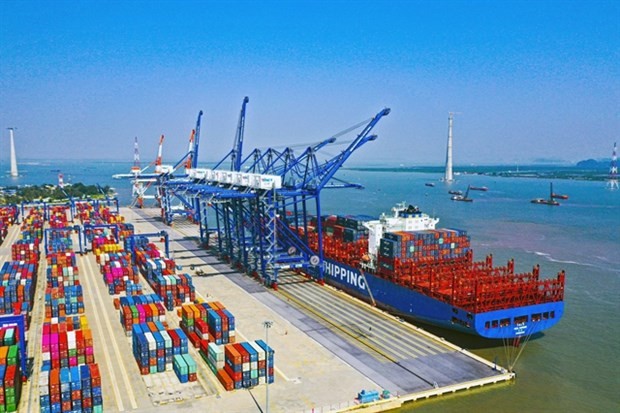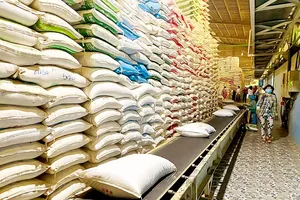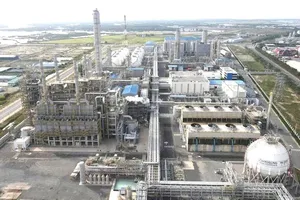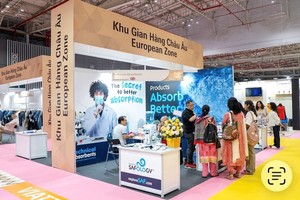 A container ship at Lach Huyen Seaport. (Photo: VNA)
A container ship at Lach Huyen Seaport. (Photo: VNA)
According to SSI Securities, exports to large trade partners, including the US and EU, continued to decline in September at Cai Mep Seaport and Lach Huyen Seaport.
Experts forecast that maritime trade would not reach the figures seen in previous years even in peak seasons because of retailers' high inventory levels.
For container-shipping firms, the situation is expected to worsen in late months of the year due to falling freight rates, which have slipped by roughly 20 percent domestically since early 2022.
Analyst Pham Minh Quang, BIDV Securities, estimated that international freight rates would continue to drop by around 12 percent towards Q1/2023, caused by high inventory levels and high inflation. Domestic freight rates would follow suit with a drop of about 5 percent amid a slow recovery of vessel supply.
Analyst Nguyen Quynh Hoa from MB Securities, shared this view, forecasting that maritime trade carried by containers would slow down in short term on grounds of weak demand.
However, the outlook for the industry would be optimistic in long term thanks to the improvement of global geopolitical conflicts, the easing of Covid-19 preventive measures, and the rebound of container supply.
Imports and exports are projected to pick up in the coming years as a result of the fully implementation of Free Trade Agreements and the lowering of trade barriers ensuing.
For the time being, many maritime transport firms are running at a profit.
Vietnam Ocean Shipping JSC (HOSE: VOS) made an after-tax profit of VND154.1 billion in Q3, down 17 percent against Q3/2021.
The firm said freight rates remained at good levels in the first nine months of 2022 despite a volatile market. It won several contracts to transport dry commodities at high freight rates during the period.
"Oil-powered vessels turned high profits from late Q2, contributing greatly to our total profits," said a VOS representative.
Apart from the profits generated by its own vessels, the firm also had extra earnings from two oil-powered vessels, Dai An and Dai Phu, chartered since late 2021.
Vietnam Tanker JSC (HOSE: VTO) raked in VND23.8 billion after tax in Q3, tenfold as large as the figure last year.
A VTO representative attributed the boom in profits to "the increase in time charter rates and in coastal vessel activities compared to Q3/2021".
Remarkably, higher time charter rates contributed nearly VND100 billion to its revenues and VND25 billion to its after-tax profits.
Vinafco JS Corporation (UPCoM: VFC), likewise, saw its after-tax profits increase by roughly 51 percent during the period. The firm said its profitability came from its better performance in transport and financial activities.
Vinaship JSC (UPCoM: VNA) also operated profitably with an after-tax profit of VND63.7 billion, down 7 percent year-by-year.
It is worth noting that several firms are stepping up seaport development to cater for higher maritime trade in the long term.
Germadept Corporation (HOSE: GMD) is in process of completing necessary procedures to begin the construction of Gemanlink Port phase 2 this year. The port, with an estimated capacity of 1.5 million TEU, is expected to begin in 2024.
Meanwhile, 50 percent of the construction works in Nam Dinh Vu Port phase 2 has been completed. The port has an estimated capacity of between 0.6 million and 1.2 million TEU.
VOS stocks ended the November 4 session at VND9,500, VTO at VND7,200, and GMD at VND48,700.
Experts forecast that maritime trade would not reach the figures seen in previous years even in peak seasons because of retailers' high inventory levels.
For container-shipping firms, the situation is expected to worsen in late months of the year due to falling freight rates, which have slipped by roughly 20 percent domestically since early 2022.
Analyst Pham Minh Quang, BIDV Securities, estimated that international freight rates would continue to drop by around 12 percent towards Q1/2023, caused by high inventory levels and high inflation. Domestic freight rates would follow suit with a drop of about 5 percent amid a slow recovery of vessel supply.
Analyst Nguyen Quynh Hoa from MB Securities, shared this view, forecasting that maritime trade carried by containers would slow down in short term on grounds of weak demand.
However, the outlook for the industry would be optimistic in long term thanks to the improvement of global geopolitical conflicts, the easing of Covid-19 preventive measures, and the rebound of container supply.
Imports and exports are projected to pick up in the coming years as a result of the fully implementation of Free Trade Agreements and the lowering of trade barriers ensuing.
For the time being, many maritime transport firms are running at a profit.
Vietnam Ocean Shipping JSC (HOSE: VOS) made an after-tax profit of VND154.1 billion in Q3, down 17 percent against Q3/2021.
The firm said freight rates remained at good levels in the first nine months of 2022 despite a volatile market. It won several contracts to transport dry commodities at high freight rates during the period.
"Oil-powered vessels turned high profits from late Q2, contributing greatly to our total profits," said a VOS representative.
Apart from the profits generated by its own vessels, the firm also had extra earnings from two oil-powered vessels, Dai An and Dai Phu, chartered since late 2021.
Vietnam Tanker JSC (HOSE: VTO) raked in VND23.8 billion after tax in Q3, tenfold as large as the figure last year.
A VTO representative attributed the boom in profits to "the increase in time charter rates and in coastal vessel activities compared to Q3/2021".
Remarkably, higher time charter rates contributed nearly VND100 billion to its revenues and VND25 billion to its after-tax profits.
Vinafco JS Corporation (UPCoM: VFC), likewise, saw its after-tax profits increase by roughly 51 percent during the period. The firm said its profitability came from its better performance in transport and financial activities.
Vinaship JSC (UPCoM: VNA) also operated profitably with an after-tax profit of VND63.7 billion, down 7 percent year-by-year.
It is worth noting that several firms are stepping up seaport development to cater for higher maritime trade in the long term.
Germadept Corporation (HOSE: GMD) is in process of completing necessary procedures to begin the construction of Gemanlink Port phase 2 this year. The port, with an estimated capacity of 1.5 million TEU, is expected to begin in 2024.
Meanwhile, 50 percent of the construction works in Nam Dinh Vu Port phase 2 has been completed. The port has an estimated capacity of between 0.6 million and 1.2 million TEU.
VOS stocks ended the November 4 session at VND9,500, VTO at VND7,200, and GMD at VND48,700.
























